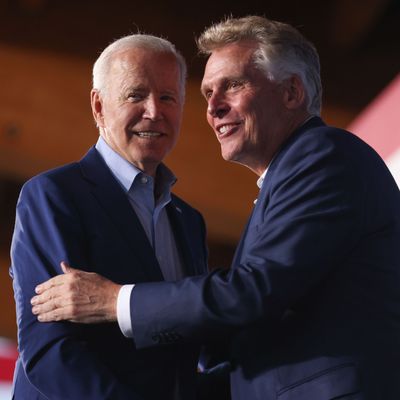
With the attempted recall of California Governor Gavin Newsom lying in ruins, political types desperate for off-year bellwethers are shifting their their gaze to the Commonwealth of Virginia’s elections in November. They will certainly be easier to interpret. Unlike California and its strange two-question recall ballot, Virginia is having a regular general election, albeit one with no federal offices (or state-senate seats) on the ballot. Nor will Virginians all get an unsolicited mail ballot as Californians did: While Virginia has moved rapidly toward liberalized voting rules under recent Democratic governance (even enacting its own voting-rights law), voters still have to take the initiative to vote early in person or by mail.
But the biggest difference is that while Virginia has “turned blue” in recent elections (Republicans have not won a statewide contest since 2009), it is vastly more competitive than California, which wasn’t about to elect a Republican governor other than through the bizarre two-step process of a vote to remove Newsom combined with a plurality of the vote in a replacement contest that Democratic candidates (and many Democratic voters) were boycotting. In Virginia, Republican gubernatorial nominee Glenn Youngkin has a puncher’s chance of defeating Democratic former governor Terry McAuliffe straight up.
But different as the two states and their contests undoubtedly are, McAuliffe seems to be going with much of the Newsom playbook, according to the intrepid Ron Brownstein:
McAuliffe is betting mostly on the same three messages that lifted Newsom in California. He’s relentlessly linked the Republican to Trump, who endorsed him. McAuliffe has also called for codifying the right to abortion in the Virginia Constitution, an issue that has gained relevance since five GOP-appointed Supreme Court justices recently refused to block a Texas law banning abortion after about six weeks.
Above all, McAuliffe has hammered Youngkin for opposing mask and vaccine mandates to fight the Covid-19 outbreak.
This McAuliffe ad isn’t quite as hard-edged as Newsom ads accusing top Republican rival Larry Elder of being an anti-vaxxer, but it’s close:
Youngkin, on the other hand, doesn’t have Elder’s rich record of controversial right-wing utterances and questionable personal conduct; indeed, part of his appeal to Republicans is that he is one of those “outsider-businessman” candidates with no record and huge sacks of money he has been willing to use to self-fund his campaign. After winning the nomination (and a Trump endorsement) with the minimum MAGA posturing necessary, Youngkin has fallen silent on controversial issues as much as he can, instead deploying an anodyne moderate-conservative message about more jobs and fewer taxes. This distinctly unalarming ad is typical:
Youngkin cannot actually “move to the center,” as Virginia-based political scientist Larry Sabato explained to Brownstein:
To maintain the super-heated energy that Trump generated among the GOP’s mostly rural Virginia base, “he can’t change” his opposition to vaccine mandates or legal abortion, even though those views limit his suburban potential. “Youngkin’s affable and he’s a good guy. But he can’t do anything about the positions that are hurting him [in the suburbs],” says Sabato.
To win, Youngkin has to count on the natural midterm swing against the party that controls the White House, a tendency that until recently was an iron law of Virginia politics. In 2013, McAuliffe broke a streak of nine consecutive gubernatorial races in which the party controlling the White House lost. Even though Biden won Virginia by ten points in 2020, his job approval ratio has been underwater in recent Virginia polls: 46 percent approve and 51 percent disapprove, for example, in the latest Washington Post–George Mason University poll. It’s possible Virginia voters are exhibiting some fatigue with Democrats generally: That same Post-GMU poll showed outgoing Governor Ralph Northam’s approval ratings sagging as he prepares to leave office.
As always, the late-campaign focus on building partisan enthusiasm should sharpen the Virginia race as Election Day grows nigh, though Virginia candidates don’t have the partisan voter-registration lists that made intense targeted messaging so easy in California. Expect to see a lot of Trump images in McAuliffe ads and a lot of allusions in Youngkin ads to whatever conservative talking point polls well among independents. The Democrat may have an advantage in that his more issue-oriented attacks on his opponent on COVID-19 policies and abortion rights should help keep progressives — among whom McAuliffe has never been terribly popular — in his camp. Youngkin, of course, will rely on the natural enthusiasm of those who despise the party in power in Richmond and in nearby Washington.
Without question, there will be a lot of ads and other paid messaging. McAuliffe is a legendary national political fundraiser, while Youngkin is rich as Croesus. So far, McAuliffe has led every public poll of the race, but it seems to be tightening: In the FiveThirtyEight polling averages, which adjust the results to account for reliability and partisan bias, McAuliffe is currently up by just 3.1 percent. Neither candidate can afford a serious mistake, and whatever happens will likely be spun to death as either an unmistakable sign of things to come or an irrelevant outlier as the midterms approach.






























